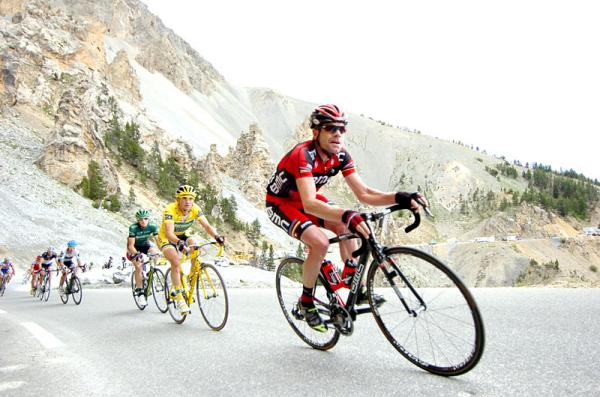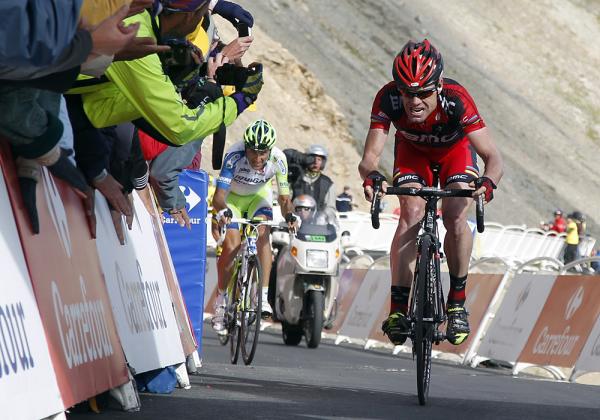Evans surprised with Tour de France rivals' tactics
BMC's contender limits losses in calculating performance


If Andy Schleck's winning ride on the Galibier was the most courageous performance of the Tour de France's queen stage, that of Australian Cadel Evans was the most calculated.
The BMC team's leader chose not to follow the Leopard Trek rider when he attacked on the Col d'Izoard, instead looking at the situation in the general classification and the conditions that lay ahead in the next 60 kilometers when deciding to wait.
"I was sitting right behind [Andy Schleck] watching him get ready to do an attack. I was ready, but more looking at the time gaps and the numbers," Evans said.
"I can't control the attack from everyone when if Andy comes back, Fränk's probably going to go away. For me, having Andy away, at least there's only one I have to control in the final.
"They put it all on the line, and they really had to with a long-range attack there," Evans said of Leopard Trek, who placed two riders, Maxime Monfort and Joost Posthuma into the early breakaway so they could be present to help Schleck on his voyage through the valley between the Izoard and the final climb up the Galibier.
In ideal world, Schleck's attack should never have gained as much as the more than two-minute gap he enjoyed at the top. Evans described the obstacle the slight Luxembourger faced, even with help from the remnants of the breakaway.
"On a numbers basis, [it was] 20-30km of block headwind [in the] upper valley... we're 40 and they're four riding at the front, with one to nine guys riding behind. They rode incredibly fast in front, I don't quite understand how they made so much time."
Get The Leadout Newsletter
The latest race content, interviews, features, reviews and expert buying guides, direct to your inbox!
Schleck got help not only from Monfort, but also Quick Step's Dries Devenyns who put in some efforts before the final ascent. Behind, Evans found himself without much firepower to help defend as the climb began, especially after both defending champion Alberto Contador and Euskaltel-Euskadi's Samuel Sanchez began struggling and pulled their men off the front.
"Some teams were riding, Euskaltel-Euskadi had four guys riding, but they were riding with three or four others from other teams and still losing time."
Not even the Europcar teammates of the yellow jersey Thomas Voeckler pitched in to help claw back the four-minute deficit the group had to Schleck at the base of the final climb.
"It's my Tour to win and mine to lose, but when Voeckler and his team quit riding and he has the yellow, it was a bit bizarre. They've ridden a lot all week, but then he still had a teammate in the end. It was a bit strange in the end, they looked at me to do the work, but I was alone."
In the end, an attack from Fränk Schleck, who had been four seconds behind Evans, succeeded in gaining him enough time to drop Evans from second overall to fourth.
"I'm never happy to lose places on GC," Evans said, and is now looking at the penultimate stage's time trial which follows tomorrow's stage to the Alpe d'Huez to gain back time.
"It always was going to be crucial," Evans said of the time trial in Grenoble. "As long as we're within one to two minutes of each other in such a hard time trial, there can be big gaps [opened up] if you arrive there a little bit less fatigued than others around you."
The situation isn't too grim for the Australian: he is now just 1:12 off the yellow jersey, 57 seconds behind Andy Schleck and just four seconds behind Fränk Schleck.

Laura Weislo has been with Cyclingnews since 2006 after making a switch from a career in science. As Managing Editor, she coordinates coverage for North American events and global news. As former elite-level road racer who dabbled in cyclo-cross and track, Laura has a passion for all three disciplines. When not working she likes to go camping and explore lesser traveled roads, paths and gravel tracks. Laura specialises in covering doping, anti-doping, UCI governance and performing data analysis.